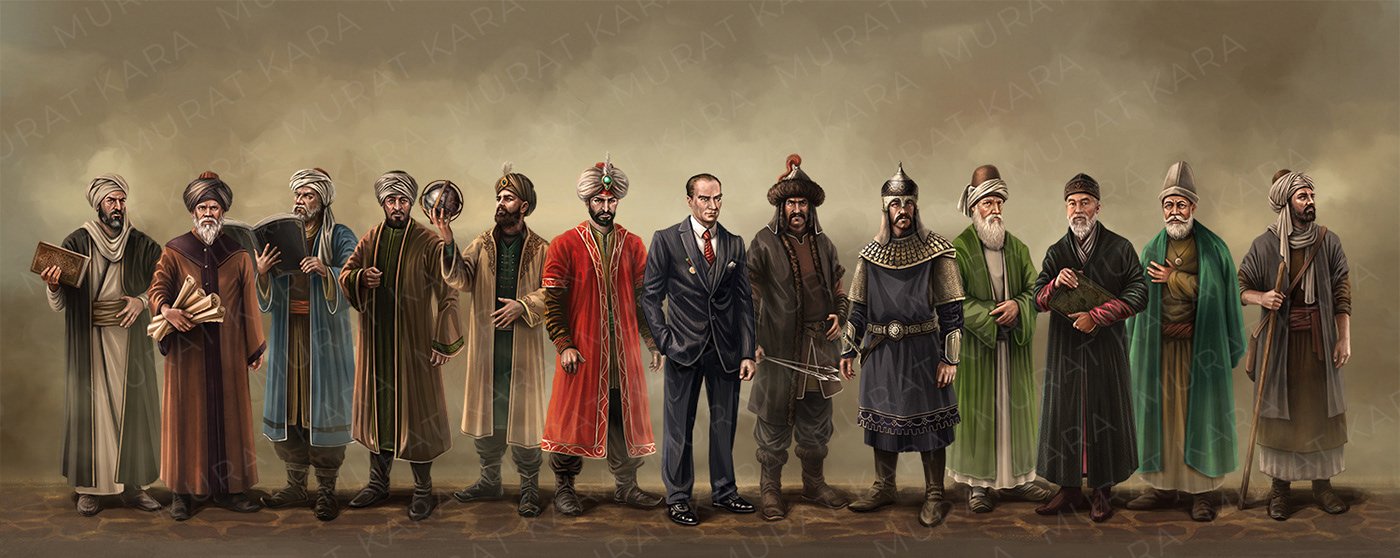the 4th century CE until the 11th century CE. During this period, the region was heavily influenced by Christianity and the Byzantine Empire’s Greek and Roman heritage.
In 1071 CE, the Seljuk Turks, a nomadic Turkic tribe from Central Asia, defeated the Byzantine army in the Battle of Manzikert, which marked the beginning of the Turkic presence in Anatolia. The Seljuk Empire was then established in the region and controlled much of Anatolia for several centuries. The Seljuks were known for their patronage of the arts and sciences, and during this period, the region became a center of learning and culture.
In the 13th century, the Seljuk Empire was conquered by the Ottoman Turks, who established an empire that would last for more than 600 years. The Ottoman Empire was one of the most powerful empires of its time, and at its height, it controlled much of Europe, Asia, and Africa. The Ottoman Empire was known for its military prowess, as well as its achievements in art, architecture, and science.
The Ottoman Empire collapsed following World War I, and in 1923, the Republic of Turkey was established. The new Republic was a secular state, and its founder, Mustafa Kemal Ataturk, implemented a series of reforms aimed at modernizing the country. These reforms included the adoption of a new alphabet, the establishment of a new legal code, and the promotion of education and women’s rights.
Today, Turkey is a modern, secular democracy that is a member of the United Nations and NATO. While its past is rich and diverse, Turkey is also looking forward to a bright future, with a strong economy and a growing role in regional and international affairs.
Sure, Turkey has a rich and diverse history, with many different cultures and civilizations leaving their mark on the region. One of the most important and influential of these was the Ottoman Empire, which controlled much of the region for more than 600 years.
The Ottoman Empire was founded in the late 13th century by Osman I, and it quickly grew to become one of the most powerful empires of its time. The empire was known for its military prowess, and it expanded to control much of Europe, Asia, and Africa.
During the Ottoman period, the empire was ruled by a powerful central government, and it was organized along feudal lines. The sultan was the ultimate authority, and he was advised by a council of ministers and a corps of bureaucrats.
The Ottoman Empire was also known for its achievements in art, architecture, and science. The Ottomans were great patrons of the arts, and they built many beautiful buildings and monuments. They also developed a rich literary tradition, and many poets, scholars, and scientists flourished during this period.
The empire’s decline began in the late 18th century, and by the early 20th century, it was in a state of decline. After World War I, the empire was dissolved, and the Republic of Turkey was established in 1923.
Despite its decline, the legacy of the Ottoman Empire can still be seen throughout Turkey today. Many of the country’s most famous buildings and monuments were built during the Ottoman period, and the country’s culture and traditions are heavily influenced by its Ottoman heritage.
It’s worth noting that Ottoman Empire was a multi-ethnic and multi-religious empire, with large communities of Christians, Jews, and other minorities living under its rule. Even though they were not equal citizens, they were still protected by the state, and their rights and religious practices were respected. However, with the decline of the empire, some of these minority groups faced discrimination, persecution and even genocide.
In the decades following the establishment of the Republic of Turkey, the country underwent significant political and social changes. The new government, led by Mustafa Kemal Ataturk, implemented a series of sweeping reforms aimed at modernizing the country and moving it away from its Ottoman past. These included the adoption of a new alphabet, the establishment of a new legal code, and the promotion of education and women’s rights.
In the years following Ataturk’s death in 1938, Turkey experienced periods of political instability, with a series of military coups and government changes. However, in recent decades, Turkey has experienced a period of economic growth and stability, and it has become an increasingly important player on the international stage.
Today, Turkey is a modern, secular democracy, and it is a member of the United Nations and NATO. The country has a rapidly growing economy, and it is becoming an increasingly popular tourist destination. Its rich history and diverse culture continue to attract visitors from around the world.
In summary, Turkey has a rich and diverse history that spans thousands of years and has been shaped by a variety of cultures and civilizations. From the Hittites and the Seljuk Turks to the Ottoman Empire and the modern Republic of Turkey, the country has seen many changes and transformations over the centuries. Today, Turkey is a modern, secular democracy with a rapidly growing economy and a rapidly growing role in regional and international affairs.






Marvin Guilbeau
You made some really good points there. I checked on the
net for additional information about the issue and found most individuals will go along with your views on this
site.